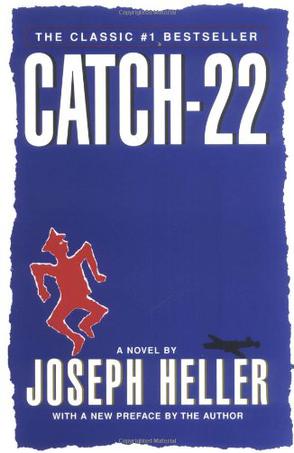Catch-22
Joseph Heller
Catch-22 is like no other novel. It is one of the funniest books ever written, a keystone work in American literature, and even added a new term to the dictionary.
At the heart of Catch-22 resides the incomparable, malingering bombardier, Yossarian, a hero endlessly inventive in his schemes to save his skin from the horrible chances of war. His efforts are perfectly understandable because as he furiously scrambles, thousands of people he hasn't even met are trying to kill him. His problem is Colonel Cathcart, who keeps raising the number of missions the men must fly to complete their service. Yet if Yossarian makes any attempts to excuse himself from the perilous missions that he is committed to flying, he is trapped by the Great Loyalty Oath Crusade, the hilariously sinister bureaucratic rule from which the book takes its title: a man is considered insane if he willingly continues to fly dangerous combat missions, but if he makes the necessary formal request to be relieved of such missions, the very act of making the request proves that he is sane and therefore ineligible to be relieved.
Catch-22 is a microcosm of the twentieth-century world as it might look to some one dangerously sane -- a masterpiece of our time.
There was a time when reading Joseph Heller's classic satire on the murderous insanity of war was nothing less than a rite of passage. Echoes of Yossarian, the wise-ass bombardier who was too smart to die but not smart enough to find a way out of his predicament, could be heard throughout the counterculture. As a result, it's impossible not to consider Catch-22 to be something of a period piece. But 40 years on, the novel's undiminished strength is its looking-glass logic. Again and again, Heller's characters demonstrate that what is commonly held to be good, is bad; what is sensible, is nonsense.
Yossarian says, "You're talking about winning the war, and I am talking about winning the war and keeping alive."
"Exactly," Clevinger snapped smugly. "And which do you think is more important?"
"To whom?" Yossarian shot back. "It doesn't make a damn bit of difference who wins the war to someone who's dead."
"I can't think of another attitude that could be depended upon to give greater comfort to the enemy."
"The enemy," retorted Yossarian with weighted precision, "is anybody who's going to get you killed, no matter which side he's on."
Mirabile dictu, the book holds up post-Reagan, post-Gulf War. It's a good thing, too. As long as there's a military, that engine of lethal authority, Catch-22 will shine as a handbook for smart-alecky pacifists. It's an utterly serious and sad, but damn funny book.





